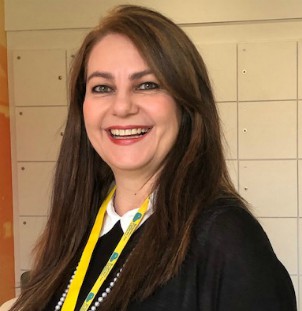“I have worked in many places where you are not allowed to think outside the box. Here things are different – they listen to your ideas and let you try them. It’s every social worker’s dream.”
This is Patrick Mukalazi, manager of one of the children looked after teams at Brighter Futures for Children, on the learning culture the not-for-profit company that runs children’s services in Reading fosters for its staff.
Social workers and managers say this culture is one that prioritises learning and development over targets, professional autonomy over management direction and the celebration of success over the apportioning of blame.
And it is one that comes from the top – from Deborah Glassbrook, director of children’s services, and Maria Young, director of children’s social care, both of whom joined Brighter Futures in the second half of last year.
Investing in relationships
For Maria, fostering this culture is part and parcel of delivering improvements in the lives of the children and families Brighter Futures serves.
The company has been on an improvement path since it took over responsibility for children’s services from the inadequate-rated Reading Borough Council in December 2018, gaining a ‘requires improvement’ from Ofsted following an inspection in September 2019. However, Maria says that, on joining in July 2019, she recognised the need to make changes for a workforce who had historically felt “done to” and blamed when things had gone wrong.
She says: “I knew I wasn’t going to change things overnight, [I asked] them what has worked, what is already good

Maria Young, director of children’s social care at Brighter Futures for Children
established practice and what we need to change. We did staff surveys and talked about opportunities [for progression] and that started to shift how people felt.”
Maria adds: “If you want to make changes in children’s and families’ lives, you need to invest in relationships [with staff]. You need to role model what you expect as a leadership team, placing a higher premium on supervision, group supervision, team meetings, any forum in which you can get to know your staff, so they feel able to talk about when things go wrong.”
And she says she can see the impact. Re-referrals have fallen below the level of similar authorities and there are fewer children being placed on a child protection plans for a second time.
“Our families give us email correspondence to say that they appreciate the support they receive,” says Maria. “Our families’ forum – for children with disabilities – has confidence for the first time in years that we are delivering on what we’ve promised. In our monthly audits, we get feedback from the parents and children and that gives us an indication that we are moving in the right direction.”
Key performance indicators have improved month on month, reaching a high point in August, says Maria. Though “they don’t tell the whole story, this is a measure of the shift in practice,” something that has been noted by the company board, the judiciary and, she believes, the Department for Education.
Praise not blame
“Practitioners have lived up to any aspiration I had,” she adds. “They are just remarkable that workforce of mine.” And she, Deborah and other leaders are not shy about telling social workers so.
“An amazing change for me from Reading to Brighter Futures is that we’ve got so much connection with senior management,” says children looked after social worker Patience Kutama, who has worked in Reading since 2016. “If you have done a good piece of work and your manager happens to say that in a management meeting, the director will send you a complimentary email. Our job is so stressful and can be emotionally draining, so just getting a compliment goes a long way. It shows they value the work that you do.”
Nadine Hartman, a social worker in one of Brighter Futures’ family intervention teams – which work with families from access and assessment up to care proceedings – agrees: “When a good piece of work has been done [managers] are really good at pointing that out and saying they appreciate your hard work. It’s really motivating.”
Patrick says that management meetings now start with a review of what has gone well, something Maria has strongly promoted.
“Maria has an uphill battle convincing a social worker to acknowledge their success,” he says. “By nature we are very modest, but she is saying we need to celebrate the positives.
“I make sure the team understand how difficult their job is, how well they are doing and how good they are.”
When things are not working, the focus is on solutions not blame. Patrick says: “Before the company was set up, [senior managers] would just look at numbers, for example, why you have so many children on plans, because they would be hauled over the coals for that. Now the understanding is that this is not a sign of failure. If the number of visits in my team have been low for three months, I’m asked if we need to get more staff in.”
Opportunities linked to interests
Practitioners are also strongly supported in their learning and, significantly, enabled to develop in those areas which most interest them.
Nadine, who left Brighter Futures in March 2019 only to return in October of that year, first as an agency worker and then on a permanent basis, says: “That’s really promoted. So, for example, I like working on domestic abuse cases so I’m being supported to specialise in that area. Since I came back I’ve been asked ‘where are you looking to progress to?’ I’ve been enrolled in the practice educator course. I’ve been wanting to do that for a long time so I’m really excited about that.”
This focus is equally strong among the group of eight practitioners who have just completed their assessed and supported year in employment, among them Barry Tucker, who also works in a family intervention team.
“They are developing a programme for us eight about where we want to be and how we are going to get there. I want to stay in this role for a year to 18 months and then move around,” he says. “There are a lot of opportunities to do that.”
Practitioners are encouraged to go for promotions or new roles and the experience is positive even if you are not successful, says family intervention team social worker Paulette Marshall.
“There was one particular role I went for [and didn’t get] and my manager offered me mentoring so if another opportunity came up for a similar role, I’d be more confident, rather than feeling discouraged,” she says.
For team managers, the company has invested in coaching training to support them to get the best out of their practitioners and, says Patrick, become more confident in arguing their case, where necessary, with senior managers.
He recalls a discussion about a young person’s placement, which a senior manager wanted to review on ‘value for money’ grounds. “What we were taught in coaching is that you have to be crystal clear about what the consequences will be of the decision you are being asked to consider. So, I went into that meeting and said that if we moved Johnny, this is how it’s going to affect him, and I would need to have an additional two members of staff to deal with the fallout. So, the senior manager said ‘maybe it’s not the right time’. Previously, I would have said ‘you can’t move Johnny, it’s not fair’ but that doesn’t have any substance.”
Professional autonomy
This reflects the premium the company places on social workers and managers taking decisions for themselves and developing their professional judgment.
Children looked after social worker Patience Kutama says: “My manager will say when you call him to consult, ‘you tell me, you come up with the solution, I’m going to listen’. It’s rare that they impose things on you. At the end of the day you know the children and families better – that’s what my manager says. I feel very empowered in my decision making.
Maria is keen to take this approach further: “The next step for me is for social workers to feel truly confident to make professional judgments that require less managerial checking out on everything. So, you’ve got a real skilled, confident workforce which obviously leads to good outcomes. I really want more social workers to join to actually help them to be the most skilled professionals they can be.”
So why consider Brighter Futures for Children for your next role? Patience says: “I believe they’ve got our interests at heart and they recognise the amount of pressure we go through as social workers. Just being acknowledged and recognised for the work that you do goes a long way. It’s a great place to work and I don’t intend to move anytime soon. I think there’s room for growth. You can become anything that you want to be if you are ready to take up the offers.”
Are you interested in a role at Brighter Futures for Children? Take a look at the latest vacancies.




 Facebook
Facebook X
X LinkedIn
LinkedIn Instagram
Instagram